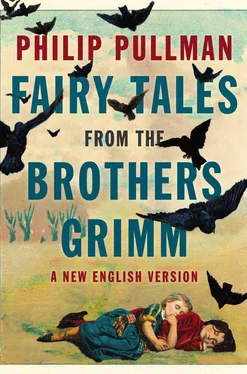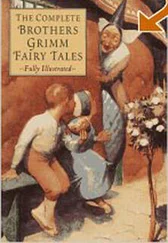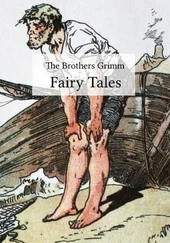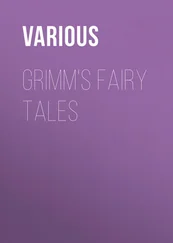Before he flew away, the stork took another bundle off his back and handed it to the king. In it there were combs, mirrors, ribbons and what not, presents for all the princesses except the eldest, because her present was the tailor for a husband.
‘It seems to me that I’ve got the best prize of the lot,’ said the tailor. ‘My old mother was right after all. She always used to say that whoever trusts in God can’t fail, as long as his luck holds, that is.’
The shoemaker had to make the shoes in which the tailor danced at his wedding. After that, though, he was ordered to leave the city for ever. He left in a foul mood and slouched along the road towards the forest, which led him past the gallows. By that time he was worn out; tired, hot, angry and bitter, he threw himself down and was about to fall asleep when the two crows who’d been sitting on the heads of the hanged men flew down and pecked his eyes out. At that point he went mad, and he ran off into the forest, where he must have died of hunger, for he was never seen again.
* * *
Tale type:ATU 613, ‘The Two Travellers’, continuing as ATU 554, ‘The Grateful Animals’
Source:a story told to the Grimm brothers by a student named Mein from Kiel
Similar stories:Alexander Afanasyev: ‘Right and Wrong’ ( Russian Fairy Tales ); Katharine M. Briggs: ‘The King of the Herrings’ ( Folk Tales of Britain ); Italo Calvino: ‘The Two Muleteers’ ( Italian Folktales ); Jacob and Wilhelm Grimm: ‘The Queen Bee’, ‘The Sea-Hare’, ‘The White Snake’ ( Children’s and Household Tales )
This tale didn’t appear in the Grimms’ collection until their fifth edition, in 1843. It’s one of the most delightfully vigorous of all the stories; it moves forward without a pause or a hitch, and the two tale types are sewn together so neatly that you can’t see the join. The little tailor himself would be proud of this workmanship. So should the student called Mein, who was the Grimms’ source.
Like many folk-tale tailors, this one is small, cheerful and lucky. He has a great deal in common with other Grimm protagonists, who, as Jack Zipes points out, ‘come largely from the peasant, artisan, or mercantile class. By the end of many of the tales, these protagonists, whether male or female, experience a rise in fortune that enables them to win a wife or husband, amass a fortune and power… The succession to power of lower-class figures is legitimized by their essential qualities of industriousness, cleverness, opportunism, and frankness’ ( The Brothers Grimm , pp. 114–15).
That certainly describes the little tailor, though luck plays a big part in his good fortune as well. As for the shoemaker, he is a villain from the start. Bad luck to him.
THIRTY-EIGHT
HANS-MY-HEDGEHOG
Once there was a farmer who had all the money and land he wanted, but despite his wealth there was one thing missing from his life. He and his wife had never had any children. When he met other farmers in town or at the market, they would often make fun of him and ask why he and his wife had never managed to do what their cattle did regularly. Didn’t they know how to do it? In the end he lost his temper, and when he got back home, he swore and said, ‘I will have a child, even if it’s a hedgehog.’
Not long afterwards his wife did have a child, a boy, as they could see from his bottom half. The top half, though, was a hedgehog. When she saw him, she was horrified.
‘See what you’ve done!’ she cried. ‘This is all your fault.’
‘It can’t be helped,’ said the farmer. ‘We’re stuck with him. He’ll have to be baptized like a normal boy, but I don’t know who we can ask to be godfather.’
‘And the only name we can give him,’ she said, ‘is Hans-my-Hedgehog.’
When he was baptized, the priest said, ‘I don’t know what you’ll do for a bed. He can’t sleep on a normal mattress, he’d jab holes all over it.’
The farmer and his wife saw the truth of that, and put some straw down behind the stove and laid him there. His mother couldn’t suckle him; she tried, but it was too painful altogether. The little creature lay behind the stove for eight years, and his father grew sick to death of him. ‘I wish he’d kick the bucket,’ he thought, but Hans-my-Hedgehog didn’t die; he just lay there.
One day there happened to be a fair in the town, and the farmer wanted to go. He asked his wife what she’d like him to bring back for her.
‘A bit of steak and a half a dozen rolls,’ she said.
Then he asked the maidservant, and she asked for a pair of slippers and some fancy stockings. Finally he said to his son, ‘Well, what would you like?’
‘Papa,’ said Hans-my-Hedgehog, ‘I’d like some bagpipes.’
When the farmer came back, he gave his wife the steak and the rolls, he gave the maid the slippers and stockings, and finally he went behind the stove and gave Hans-my-Hedgehog his bagpipes.
Then Hans-my-Hedgehog said, ‘Papa, go to the blacksmith’s and have him make some shoes for the cockerel. Once you’ve done that, I’ll ride away and never come back.’
The farmer was happy to get rid of him, so he took the cockerel to the blacksmith’s and had him shod. Once that was done, Hans-my-Hedgehog jumped on the cockerel’s back and rode away, taking some pigs with him to tend in the forest.
When they were in the forest he spurred the cockerel up, and it flew high into a tree with him. There he sat keeping an eye on his pigs and learning how to play the bagpipes. Years went by, and his father had no idea where he was; but the herd grew bigger and bigger and he played more and more skilfully. In fact the music he made was quite beautiful.
One day a king came riding past. He had lost his way in the forest, and he was amazed to hear such lovely music, so he stopped to listen to it. He had no idea where it was coming from, so he sent a servant to find the musician. The servant looked around and finally came back to the king.
‘There’s a strange little animal sitting up in that tree, your majesty,’ he said. ‘It looks like a cockerel with a hedgehog sitting on it. And the hedgehog’s playing the bagpipes.’
‘Well, go and ask it the way!’ said the king.
The servant went and called up into the tree, and Hans-my-Hedgehog stopped playing and climbed down to the ground. He bowed to the king and said, ‘What can I do for you, your majesty?’
‘You can tell me the way to my kingdom. I’m lost.’
‘With pleasure, your majesty. I’ll tell you the way if you promise in writing to give me the first thing that greets you when you arrive home.’
The king looked at him, and thought, ‘That’s easy enough to promise. This monster won’t be able to read, so I can write anything.’
So he took pen and ink and wrote a few words on a piece of paper. Hans-my-Hedgehog took it and showed him the way, and the king set off and was soon home again.
Now the king had a daughter, and when she saw him coming back, she was overjoyed and ran down to greet him and kiss him. She was the first person he met on the way in, and of course the king thought about Hans-my-Hedgehog, and told his daughter how he had nearly had to promise her to a strange animal that sat on a cockerel and played the bagpipes.
‘But don’t you worry, my dear,’ he said. ‘I wrote something quite different. That hedgehog creature won’t be able to read.’
‘That’s a good thing, because I wouldn’t have gone with him anyway,’ said the princess.
Meanwhile, Hans-my-Hedgehog stayed in the forest enjoying himself, tending his pigs and playing his bagpipes. The forest happened to be very large, and not long afterwards another king came by, with all his servants and messengers, and he too was lost. Like the first king, he heard the beautiful music and sent a messenger to find out where it was coming from.
Читать дальше












